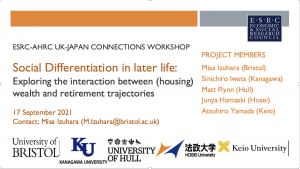
‘Social differentiation in later life: The 2nd UK-Japan international collaborative workshop exploring the interaction between (housing) wealth and retirement’
By Misa Izuhara, Professor of Social Policy
Who supports you in your transition to retirement? Is it the state, your employer or are you left to yourself to manage? Do you have sufficient financial resources including your own home to choose when to retire? Do you need to have paid work or will you look for different social participation such as volunteering after retirement? The process of retirement is becoming more complex and differentiated in terms of timing and financial resources. Active ageing policies in many advanced economies encourage older workers to remain in the labour market. However, the reasons and opportunities to do so depend on both market and institutions (e.g. retirement age, social security, attitudes of employers) as well as individual capital (e.g. health, skills, financial resources).
After a long break from the first workshop in Tokyo due to the COVID-19 pandemic, we re-convened via an online platform to explore those questions at the second collaborative international workshop on 17th September 2021. This workshop is part of the UK-Japan collaborative project ‘Social Differentiation in Later Life: Exploring the interaction between housing wealth and retirement in Japan and the UK’ which brings together scholars and stakeholders with the different disciplinary backgrounds of social policy, economics and management to examine the relationship between housing wealth and the extending working life of ageing baby-boomers in the contrasting welfare systems of the UK and Japan.
Five papers were presented covering inter-related themes:
- Matt Flynn (University of Hull) talked about older workers’ mid-career job change in the UK and Japan and how institutional structures like internal and external labour markets; regulations; unions and jobseeker support facilitate and/or inhibit older jobseekers in their pursuit of meaningful second careers. Using Amartya Sen’s Capability Approach and illustrating his arguments using interview data of older jobseekers in the two countries, he discussed how older jobseekers were able to mobilise resources to make a successful job change. He concluded by noting that people who leave the Armed Forces after the age of 50 in order to pursue a civilian career might be a useful case study for comparing the experiences of people making mid-career job changes across different countries.
- Jo Stokes (Community Services Manager, Age UK Bristol) highlighted the importance of a holistic approach to retirement in her presentation “What have we learnt from Post-Retirement Opportunities (PRO) programme”. PRO was a project, delivered by LinkAge Network in 2018-19, supporting people who had recently retired, were approaching retirement, or facing redundancy in later life to manage the transition from work to retirement. The programme delivered free workshops, events and work placements to help older workers explore opportunities and discover what they wanted from the next phase of their life. This presentation argued the importance of social participation and connections for older people beyond paid work in their post-retirement age and the role of the voluntary sector supporting the process.
- Widening wealth inequalities within and between generations was the theme of the following two presentations. Drawing on the data from the Japan Household Panel Survey, Shinichiro Iwata (Kanagawa University) and Junya Hamaaki (Hosei University) examined the impact of unpredicted shocks to house prices on labour supply decisions among older homeowners. They found that Japanese older homeowners tended to remain in the labour market even when they experienced house price inflation. Instead of leaving the labour market, older workers tended to reduce their working hours. However, such practice differs by income level and employment status since reduced hours are only observed among older men in regular employment with a high income and women in non-regular employment. The presentation raised further questions regarding the use of housing wealth in later life including the availability and actual use of equity release schemes.
- While the Japan paper discussed the impact of the economic crisis on house prices, James Smith (The Resolution Foundation) revealed the uneven impact of the COVID-19 crisis on wealth accumulation between households and between generations. The COVID-19 crisis is the first UK recession in 70 years in which wealth has increased but these gains are concentrated among households at the top of the income distribution. This partly reflects the effect on active changes in households’ savings and debt, varied by age but also by the labour market experiences and personal circumstances of individuals. For example, younger people without children were most likely to report that their savings increased during the pandemic (‘forced savings’ given the lockdown restrictions on social consumption). But changes in the value of household wealth were more affected by changing asset prices than by active changes in savings and debt. UK house prices are up around 10 per cent and equities are more than 20 per cent higher. These asset price increases drove an even larger intergenerational wedge in wealth shock. During the pandemic, adults aged 55 and older accrued 63 per cent (£559 billion) of the total increase in British household wealth (£900 billion). By contrast, those aged 20-40 accounted for just 13 per cent (£117 billion) of the total wealth rise. These large, and generationally uneven, increases in wealth mean that the picture of stalled wealth progress for younger cohorts is unlikely to come unstuck anytime soon. By way of inheritances, they are also likely to exacerbate absolute wealth gaps within younger generations, which we expect to open up in future.
- Brian Beach from University College London (formerly International Longevity Centre, UK) presented three pieces of comparative work between Japan and the UK in relation to ageing. The first example covered work published in Ageing & Society, which included seven advanced economies and examined policies related to pensions and retirement and their relationship to labour market participation in later life. Scored across four dimensions each for early retirement and later retirement, Japan and the UK were quite similar in their scores, despite having very different rates of employment among older people. This may suggest that cultural factors related to work play a significant role, above that of policy.
The second example covered a fact-finding study in Japan in May 2017, which highlighted different initiatives to address wellbeing and healthy ageing. Genki-zukuri (health creation) stations are one community-based approach in Yokohama that helps older people set up, develop, and run health-based activities and exercises. Days BLG!, in Machida City, was also featured for its innovative approach to providing day care to people with mild and moderate dementia. With links to local businesses and organisations, the service ensures that participants are engaged according to their capacity, with the group reflecting on their activities at the end of each day.
The third example highlighted the work from the UK-Japan SWAN project (Social relationships and Wellbeing in Ageing Nations). The importance of social connections for wellbeing and other outcomes in later life cannot be underestimated, but challenges appear when conducting comparative analyses in the social realm due to the complexity of measuring social connections. The critical message from this work is that people from different groups, backgrounds, or cultures may view the exact same question differently; ignoring this potential difference risks drawing invalid conclusions from comparative work exploring best practice in policy.
The presentations brought together different issues associated with ageing and work such as work-related transitions, post-retirement opportunities, and widening wealth inequalities, which generated lively discussion among the panellists and participants. Retirement processes and decisions are often not experienced or made independently from one another. The workshop indeed highlighted the dynamic interactions between (housing) wealth and retirement trajectories and decisions. Moreover, we drew interesting comparisons by exploring the topics between Japan and the UK since institutions (social security, retirement age), the housing and labour markets as well as cultural factors related to work and home ownership combine to produce differentiated practices of late career transitions and retirements.
This international project is funded by the UK Economic & Social Research Council (ESRC) UK-Japan Connections Grant. The Principal Investigator is Professor Misa Izuhara, School for Policy Studies, University of Bristol, UK. The project members include Professor Shinichiro Iwata (Co-I) (Kanagawa University, Japan), Professor Matthew Flynn (Hull University), Professor Junya Hamaaki (Hosei University, Japan) and Professor Atsuhiro Yamada (Keio University, Japan).
Contact:
Misa Izuhara, School for Policy Studies, University of Bristol (E: M.Izuhara@bristol.ac.uk, T: @MisaIzuhara)



